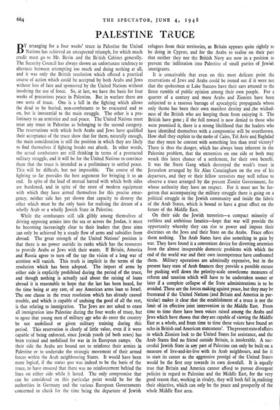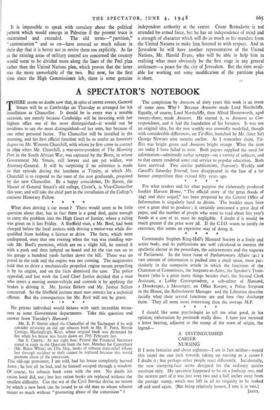PALESTINE TRUCE DY arranging for a four weeks' truce in
Palestine the United Nations has achieved an unexpected triumph, for which much credit must go to Mr. Bevin and the British Cabinet generally. The Security Council has always shown an unfortunate tendency to alternate between attempting too much and doing nothing at all, and it was only the British resolution which offered a practical course of action which could be accepted by both Arabs and Jews without loss of face and sponsored by the United Nations without involving the use of force. So, at last, we have the basis for four weeks of precarious peace in Palestine. But in warfare there are two sorts of truce. One is a lull in the fighting which allows the dead to be buried, non-combatants to be evacuated and so on, but is inessential to the main struggle. The other is a pre- liminary to an armistice and real peace. The United Nations must treat any truce in Palestine as belonging to the second category. The reservations with which both Arabs and Jews have qualified their acceptance of the truce show that for them, naturally enough, the main consideration is still the position in which they are likely to find themselves if fighting breaks out afresh. In other words, the actual combatants are still thinking in terms of a protracted military struggle, and it will be for the United Nations to convince them that the truce is intended as a preliminary to settled peace. This will be difficult, but not impossible. The course of the fighting so far provides the best argument for bringing it to an end. In spite of the load of mutual hatred with which both sides are burdened, and in spite of the store of modern equipment with which they have armed themselves for this precise emer- gency, neither side has yet shown that capacity to destroy the other which must be the only basis for realising the dream of a wholly Arab or a wholly Jewish State in Palestine.
While the combatants still talk glibly among themselves of driving opposing armies into the sea or across the Jordan, it must be becoming increasingly clear to their leaders that these aims :an only be achieved by a steady flow of arms and subsidies from abroad. The great strength of the United Nations' position is that there is no power outside its ranks which has the resources to provide Arabs or Jews with their wants. If Britain, America and Russia agree to turn off the tap the vision of a long war of attrition will vanish. This truth is implicit in the terms of the resolution which has been adopted. The import of arms by either side is explicitly prohibited during the period of the mice, and though nothing is actually said about the raising of loans abroad it is reasonable to hope that the last has been heard, for the time being at any rate, of any American arms loan to Israel. The one clause in the truce resolution which has already caused trouble, and which is capable of undoing the good of all the rest, is that relating to immigration. The Jews are not asked to cease all immigration into Palestine during the four weeks of truce, but to agree that young men of military age who do enter the country be not mobilised or given military training during this period. This reservation is clearly of little value, even if it were capable of being enforced, since Jewish youth (of both sexes) has been trained and mobilised for war in its European camps. On their side the Arabs are bound not to reinforce their armies in Palestine or to undertake the strategic movement of their armed forces within the Arab neighbouring States. It would have been more logical, if the status quo was indeed to be the basis of the truce, to have ensured that there was no reinforcement behind the lines on either side while it lasted. The only compromise that can be considered on this particular point would be for the authorities in Germany and the various European Governments concerned to check for the time being the departure of Jewish refugees from their territories, as Britain appears quite rightly to be doing in Cyprus, and for the Arabs to realise on their part that neither they nor- the British Navy are now in a position to prevent the infiltration into Palestine of small parties of Jewish immigrants.
It is conceivable that even on this most delicate point the reservations of Jews and Arabs could be ironed out if it were not that the spokesmen at Lake Success have their ears attuned to the fierce rumble of public opinion among their own people. For a quarter of a century and more Arabs and Zionists have been subjected to a raucous barrage of apocalyptic propaganda whose only theme has been their own manifest destiny and .the wicked- ness of the British who are keeping them from enjoying it. The British have gone ; if the full reward is now denied to those who were promised it, there is a strong likelihood that the leaders who have identified themselves with a compromise will be overthrown. How shall they explain to the mobs of Cairo, Tel Aviv and Baghdad that they must be content with something less than total victory? There is thus the danger, which has always been inherent in the Palestine problem, that the extremists on one side or both may wreck this latest chance of a settlement, for their own benefit. It was the Stern Gang which destroyed the week's truce in Jerusalem arranged by Sir Alan Cunningham on the eve of his departure, and they or their fellow terrorists may well refuse to observe a truce arranged by the present Zionist Government, for whose authority they have no respect. For it must not be for- gotten that accompanying the military struggle there is going on a political struggle in the Jewish community and inside the fabric of the Arab States, which is bound to have a great effect on the future of the Middle East.
On their side the Jewish terrorists—a compact minority of ruthless and ambitious fanatics—hope that war will provide the opportunity whereby they can rise to power and impose their doctrines on the Jews and their State on the Arabs. Peace offers them nothing. The Arab States have also something to gain by war. They have found it a convenient device for diverting attention from the almost insuperable domestic problems with which the end of the world war and their own incompetence have confronted them. Military operations are admittedly expensive, but in the present hazy state of Arab finances they provide a possible excuse for pushing well down the priority-scale unwelcome measures of reform and taxation which will have to be undertaken sooner or later if a complete collapse of the State administrations is to be avoided. These are the forces making against peace, but they may be frustrated if the United Nations (and Britain and America in par- ticular) makes it clear that the establishment of a truce is not the limit of its effective joint intervention in the Middle East. From time to time there have been voices raised among the Arabs and Jews which have shown that they are capable of viewing the Middle East as a whole, and from time to time these voices have found an echo in British and American statesmens'. Thepresent state of affairs in which Zionists look to the United States for assistance, and the Arab States find no friend outside Britain, is intolerable. A suc- cessful Jewish State in any part of Palestine can only be built on a measure of live-and-let-live with its Arab neighbours, and for it to start its career as the aggressive protégé of the United States would be the first step towards its own downfall. It is equally true that Britain and America cannot afford to pursue divergent policies in regard to Palestine and the Middle East, for the very good reason that, working in rivalry, they will both fail ikrealising their objective, which can only be the peace and prosperity of the whole Middle East area. It is impossible to speak with certainty about the political pattern which would emerge in Palestine if the present truce is maintained and extended. The old terms—" partition," " cantonisation " and so on—have aroused so much odium in their day that it is better not to revive them too explicitly. As far as the existing areas of military control are concerned the country would seem to be divided more along the lines of the Peel plan rather than the United Nations plan, which proves that the latter was the more unworkable of the two. But now, for the first time since the High Commissioner left, there is some genuine independent authority at the centre. Count Bernadotte is not attended by armed force, but he has an independence of mind and a strength of character which will do as much as his mandate from the United Nations to make him listened to with respect. And in Jerusalem he will have another representative of the United Nations, Mr. Harold Evans, who will be able to help him in realising what must obviously be the first stage in any general settlement—a peace for the city of Jerusalem. But the time avail- able for working out some modification of the partition plan is short.



































 Previous page
Previous page